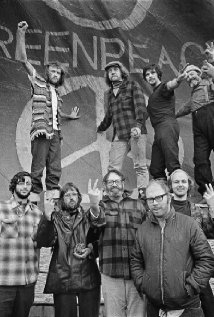
HOW TO CHANGE THE WORLD
US, 2015, 110 minutes, Colour.
Directed by Jerry Rothwell.
This is an award-winning documentary on the origins of Greenpeace. It is valuable in incorporating so much of the footage taken in the 1970s, an anticipation of what would be needed for visual documentation for the future.
The film gives the background for Greenpeace, the environmental movements of the 1970s, the Russian whale hunters and Greenpeace in pursuit of them – again, some very striking footage.
The film is also one of talking heads, and it is interesting to contrast the appearances of the men and women in the 1970s with 40 years later.
Robert Hunter is shown as the founder of Greenpeace, his leadership, his eccentricities, his being ousted from the organisation, his television career and coverage. Also featured is Paul Salmon, who clashed with him, then as well as now, and seeing his career with contemporary attacks on whale hunters.
Of interest is the character of Patrick Moore, internationalising Greenpeace but, later, giving testimony and supporting fossil fuel oil companies.
A film for discussion.
1. The 2015 perspective, the past 40 years, the environmental movement? The title and its tone?
2. Film in the 1970s, preserved, the visuals of the past, the range of footage, used within the context of the film, the framework? Stills? Musical score?
3. The importance of the talking heads and the present, the variety of opinions, with the visuals of the past activity? The characters and their appearances, clothes, styles of the 1970s compared with the present?
4. The inspiration for Greenpeace? Canada, Vancouver, the background, the changes in the 1970s? Idealists? The political atmosphere of the period?
5. Hunter, his personality, ideals, his associates? The initial mission to Alaska? Success in the, the media? The saving of the whales, the boat, the Pacific, pursuing the Russian vessel? The members of the crew, their personalities, various roles? Their ideals? The influence of religions and New Age? The I Ching?
6. The Pacific, the search, the patrols, exercising the I Ching, the planes, finding the vessel after almost giving up, petrol, food, the touch of divination? Bob Hunter and his persistence? The role of the different crewmembers? The photography, the tactics? The harpoonist firing the harpoon, the dangers to the crew? The baby whales, making the measurements? The Russian reaction, the boat,, the blood coming out, the cruelty to the whales? The buses factory?
7. Public support, press television, the variety of stories? Developing Greenpeace? The reactions, different sensibilities and views? The decision to go on protesting, the issue of the seals, using the die, Hunter and his negotiation with the locals, going to the meeting, compromising – and Paul Watson’s anger?
8. The shift to organisation and management, the talking heads, looking at the history and waiting it from the present?
9. Bob Hunter, ideals, a touch of divination? Tension, the valium, the cigarettes? Getting weary? The clashes with Paul Watson? The succession by Patrick Moore? His resignation, regrets?
10. Bob Hunter’s words and spoken by actor, Barry Pepper?
11. Bob Hunter and his television career, writing, contribution to the cause? His illness and death? His family, daughters, keeping up his tradition?
12. The contrast with Paul Watson, his past, later developments, the Sea Shepherd? His aggression, a crusader, clashing with Bob Hunter, the issue of the seals, the die, his being injured? Clashing with Patrick Moore – in the past, and his caustic comments in the present? The issue of the seals, against compromise, his own injuries, the helicopter? The reconciliation with Bob Hunter, television programmes? Hunter’s daughter?
13. Patrick Moore, his role, ideas, the organisation in Vancouver, internationalising the organisation? The clashes, with Paul Watson, resignation? His present observations? His later behaviour, companies, his denial of global warming, his behaviour in 2014?
14. The women, few, in a male atmosphere? Public opinion?
15. Photographers, the use of radio, radio and the contrast between then and now?
16. Intentions, doing good, the issue of money, the role of David MacTaggart? and the International Organisation? Adapting to new ideas, times, new technology, the media?
17. The picture of a movement which became an organisation, structure and management, financial issues, the clashes of egos? Issues of the time, autonomy, federation, human resources?
18. The contemporary presence and influence of Greenpeace?